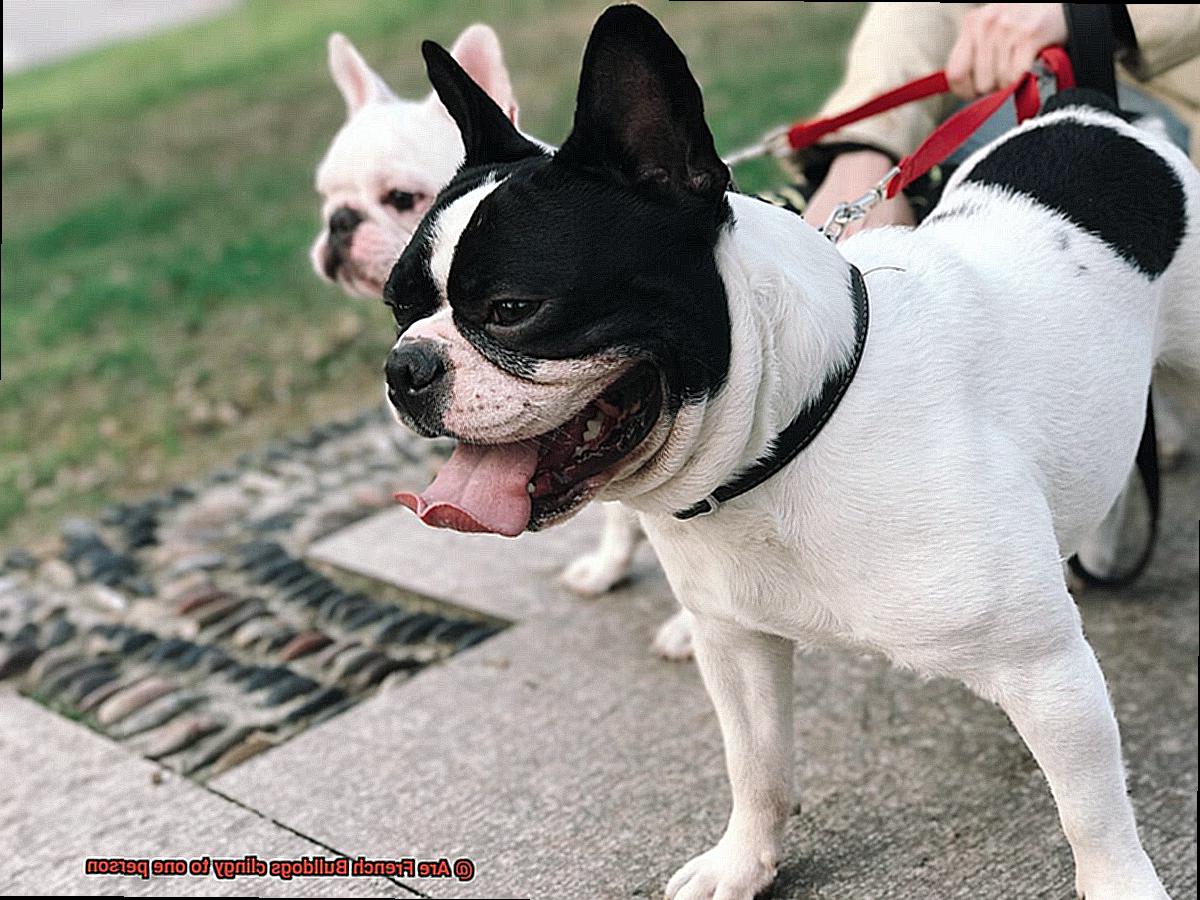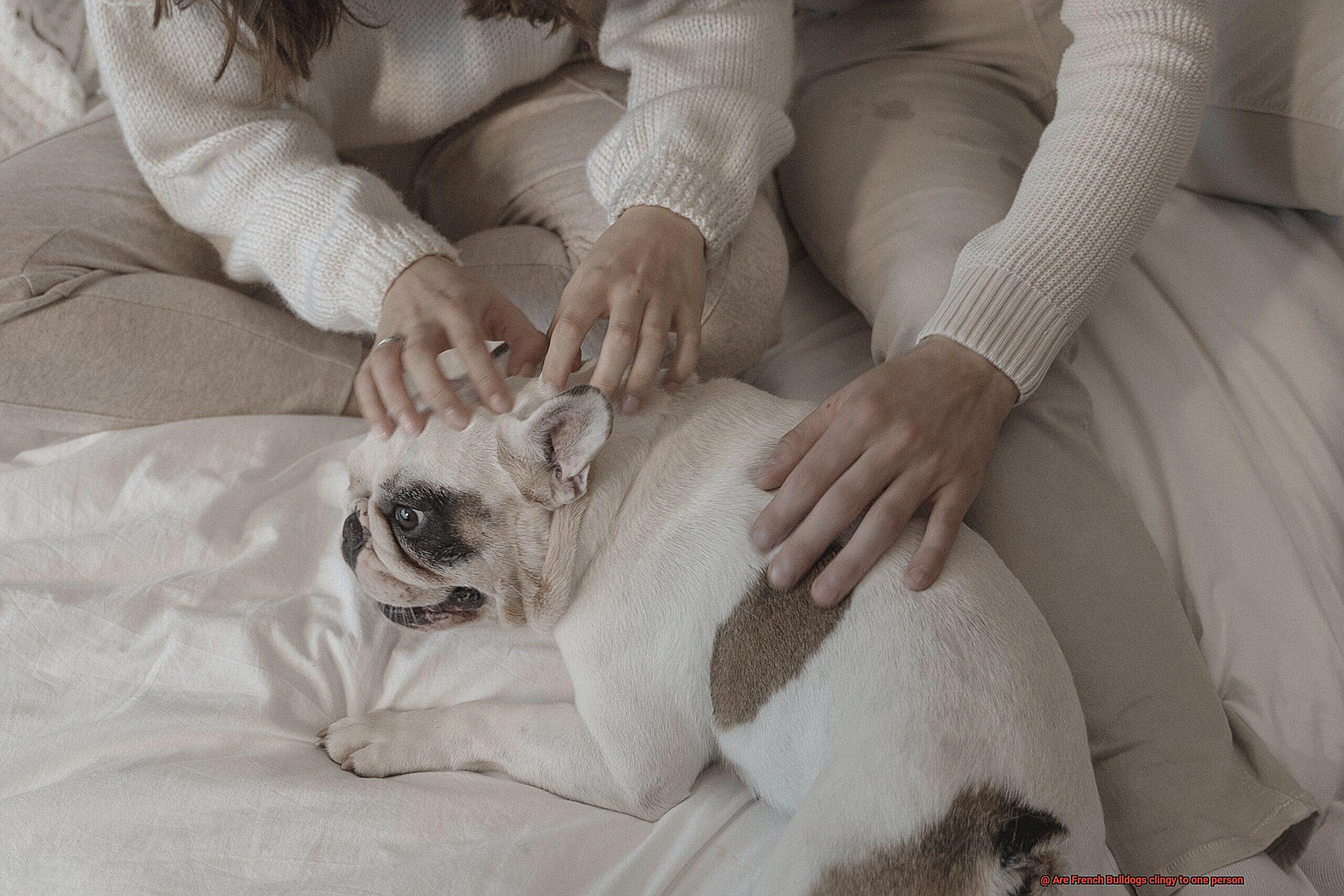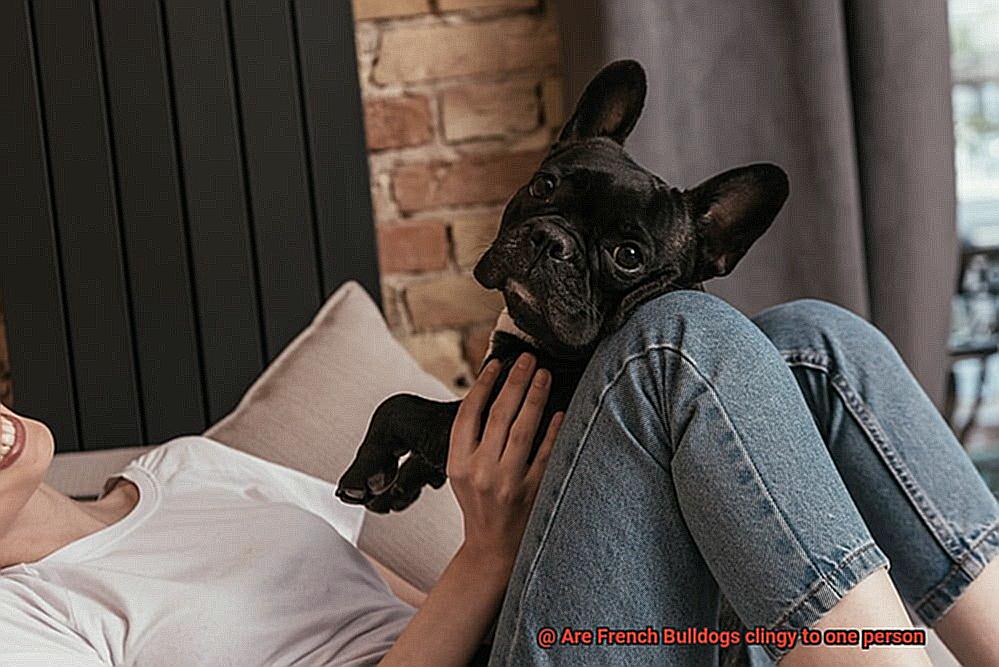Are French Bulldogs clingy to one person?
Welcome to our blog post on the captivating world of French Bulldogs and their charming behavior.
If you’ve ever crossed paths with a French Bulldog, you’ve probably noticed their distinct personality that sets them apart from other breeds. One fascinating aspect of their character is their tendency to form strong bonds with their humans.

In simpler terms, French Bulldogs are often described as “clingy” dogs. But what does it really mean for a French Bulldog to be clingy?
Does it suggest they’re overly reliant on one person and disregard everyone else? In this post, we’ll delve into this question and uncover whether these adorable furry companions truly have a preference for a particular human or if they’re simply misunderstood.
So, let’s jump in and unravel the truth behind the perception of French Bulldogs being clingy to one person.
Understanding the History of French Bulldogs
Contents
- 1 Understanding the History of French Bulldogs
- 2 How Can You Identify a French Bulldog’s Primary Caregiver?
- 3 The Pros and Cons of a French Bulldog’s Clinginess
- 4 Training Strategies for Reducing Clinginess in French Bulldogs
- 5 Socialization Techniques for Increasing Independence in French Bulldogs
- 6 Mental Stimulation as an Effective Tool in Reducing Clinginess in French Bulldogs
- 7 Establishing Boundaries and Routines to Manage Clinginess
- 8 When to Seek Professional Help for Excessive Clinginess in French Bulldogs
- 9 Conclusion

French Bulldogs, despite their name, originated in England and were bred as companion dogs. Over time, their history has shaped their tendency to form strong bonds with one person. In this blog post, we will delve into the fascinating history of French Bulldogs and how it relates to their affectionate nature and clinginess towards their owners.
The Origins of French Bulldogs:
- French Bulldogs were initially bred as smaller versions of English Bulldogs.
- They were developed to serve as companions rather than working dogs.
- The breed gained popularity among lace workers in Nottingham, England.
The Move to France:
- During the Industrial Revolution, many lace workers moved to France, bringing their beloved French Bulldogs with them.
- The breed’s name stuck, even though they were originally from England.
Crossbreeding for Improvements:
- To enhance the breed’s size, temperament, and appearance, French Bulldogs were crossed with terriers and pugs.
- These crosses helped create the distinctive features that make them easily recognizable today.
The American Kennel Club Recognition:
- In 1898, the American Kennel Club recognized French Bulldogs as a breed.
- Since then, they have become one of the most popular breeds in the United States.
Affectionate Nature and Clinginess:
- French Bulldogs are known for their friendly and affectionate nature.
- They are often described as “people-oriented” and enjoy being close to their human companions.
- While they can form strong bonds with their owners, they are generally sociable and enjoy interacting with different people.
Managing Clinginess:
- Proper socialization from a young age is crucial in preventing clingy behavior or separation anxiety.
- Exposing them to various people, environments, and experiences helps them develop into well-rounded dogs.
- Providing mental stimulation through interactive toys and training exercises can also alleviate clingy behavior.
Understanding the history of French Bulldogs sheds light on their tendency to form strong bonds with one person.
While they may have a preference for one caregiver, they are generally adaptable and can form positive relationships with multiple people.
By providing proper socialization, mental stimulation, and setting boundaries, owners can manage and balance the clinginess of French Bulldogs, ensuring a healthy and fulfilling relationship with their beloved pets.
How Can You Identify a French Bulldog’s Primary Caregiver?
French Bulldogs are known for their affectionate and clingy nature, often forming strong bonds with their primary caregiver. But how can you identify who that special person is in your Frenchie’s life? Well, fear not, because I’m here to share my expertise on this topic.
- Follow the Frenchie: One telltale sign of a primary caregiver is if the Frenchie is constantly following one person around the house. They’ll stick to them like glue, seeking their attention and becoming anxious or upset when they’re not around. So, if your Frenchie is your shadow, chances are you’re their main squeeze.
- Trust and Comfort: Dogs are instinctively drawn to those who provide them with love, care, and attention. If your Frenchie shows more affection and trust towards one person compared to others, it suggests that this person is their primary caregiver. It’s all about that special connection.
- Mealtime Madness: French Bulldogs are highly food-motivated (aren’t we all?), so if they associate one person with mealtime or treat-giving, they are likely to consider that person as their primary caregiver. They know who holds the key to their tummy’s happiness.
- Time Together: The amount of time spent together is also a big factor. If your Frenchie spends most of their time with a particular individual, whether it be during playtime, walks, or just lounging around, it suggests that this person is their primary caregiver. Quality time equals a special bond.
Remember, while Frenchies may have one primary caregiver, they can still form strong bonds with other family members or individuals in their lives. However, there’s usually one person who holds a special place in their heart. By recognizing and acknowledging the primary caregiver, you can provide your Frenchie with the love and care they need for a happy and fulfilling life.

The Pros and Cons of a French Bulldog’s Clinginess
French Bulldogs are renowned for their affectionate and clingy nature, and while this can be endearing, it also has its pros and cons. As an expert in French Bulldogs, I want to provide insights into the benefits and drawbacks of their clinginess based on my first-hand knowledge and experiences.
Pros:
- Emotional Support: French Bulldogs make excellent emotional support animals. Their constant need for attention and affection can provide comfort and companionship to individuals facing emotional or mental health challenges. They have an innate ability to sense when their owners are upset or stressed, offering a soothing presence during difficult times.
- Strengthened Bond: Their clinginess can lead to a strong bond between the dog and its owner. French Bulldogs often attach themselves to one person in the household, forming a deep connection. This loyalty and devotion can be incredibly rewarding for both the dog and the owner.
- Intuition and Sensitivity: French Bulldogs are known for being intuitive and sensitive to their owner’s emotions. They have a natural knack for sensing when their owner is feeling down or anxious, providing comfort and support. This can be particularly beneficial for individuals dealing with anxiety or depression.

Cons:
- Separation Anxiety: A downside of a French Bulldog’s clinginess is that they may struggle with separation anxiety when left alone for extended periods. This anxiety can manifest in destructive behavior, excessive barking, or even self-harm as they try to cope with the stress of being apart from their owner.
- Possessiveness: Another drawback is that their clinginess can sometimes result in possessiveness. French Bulldogs may become overly protective of their owner, exhibiting aggression towards strangers or other animals. It is crucial to socialize them properly from a young age to prevent such behavior.
- Constant Need for Attention: The constant need for attention and physical contact may be overwhelming for some owners who prefer more independent pets. French Bulldogs thrive on human interaction and may become anxious or depressed if they do not receive enough attention from their primary caregiver.
In conclusion, the clinginess of French Bulldogs has its pros and cons. It can provide emotional support, strengthen the bond between owner and dog, and offer companionship. However, it may also lead to separation anxiety, possessiveness, and a constant need for attention. As potential French Bulldog owners, it is essential to carefully consider these factors and ensure that you are prepared to meet the demands of a clingy dog before bringing one into your home.
Training Strategies for Reducing Clinginess in French Bulldogs
French Bulldogs are known for their affectionate nature and strong attachment to their owners. While this can be endearing, it can also lead to clinginess and separation anxiety. If you’re struggling with a clingy French Bulldog, don’t worry – there are effective training strategies that can help reduce clinginess and promote independence.
- Gradually Increase Independence: Start by encouraging your dog to spend short periods alone in a designated space, such as a crate or a specific room. Use positive reinforcement techniques, like treats or praise, to reward calm behavior during these times.
- Make Alone Time Enjoyable: Provide your French Bulldog with engaging toys or puzzle feeders to keep them mentally stimulated while you’re away. This will help distract them and make alone time more enjoyable.
- Practice Calm Departures and Arrivals: Avoid making a big fuss when you leave or arrive home, as this can reinforce your dog’s anxiety. Instead, maintain a relaxed demeanor and gradually increase the duration of your absences over time.
- Desensitization: Expose your French Bulldog to situations that trigger their anxiety in a controlled and gradual manner. For example, if your dog becomes anxious when you pick up your car keys, start by simply picking up the keys without leaving the house. Gradually progress to picking up the keys and opening the front door, then eventually taking short trips outside.
- Establish Consistency: Create a daily routine that includes regular exercise, mental stimulation, and alone time. Stick to this routine as much as possible, as it provides structure and predictability for your dog.
- Seek Professional Help: Consider enrolling your French Bulldog in obedience classes or working with a professional dog trainer who specializes in separation anxiety. They can provide expert guidance and support in developing a training plan tailored to your dog’s specific needs.
Remember, reducing clinginess in a French Bulldog takes time and patience. Be consistent with your training efforts and remain calm and supportive throughout the process. With proper training and guidance, you can help your French Bulldog become more independent and comfortable with being alone.
Socialization Techniques for Increasing Independence in French Bulldogs
French Bulldogs are notorious for their tendency to become overly attached to one person, causing separation anxiety and dependency issues. However, with the right socialization techniques, you can help your French Bulldog develop independence and reduce their clinginess.
In this section, we will explore various strategies to promote independence in French Bulldogs, from early socialization to positive reinforcement training.
Early Socialization:
The key to fostering independence in French Bulldogs lies in early socialization. It is crucial to start socializing your French Bulldog between 3 and 14 weeks old, as this is a critical period for their development and learning.
During this time, expose your furry friend to a variety of people, animals, and environments. This will help them build confidence, adaptability, and reduce their reliance on one specific person or location.
Playdates with Other Dogs:
Organizing playdates with other friendly dogs is an excellent way to encourage positive interactions and teach your French Bulldog appropriate social skills.
These interactions will help them understand how to communicate with other dogs and build their independence by relying less on their human companion.
Exploring New Environments:
Gradually exposing your French Bulldog to different environments is another effective method for increasing independence. Take them to parks, beaches, or busy streets to help them become more comfortable in new surroundings. This exposure will reduce their reliance on one specific environment and make them more adaptable in various situations.
Positive Reinforcement Techniques:
During socialization sessions, it is important to use positive reinforcement techniques. Reward your French Bulldog with treats, praise, and affection for calm and confident behavior. This positive reinforcement will encourage them to be more independent and reinforce the idea that exploring new experiences can be rewarding.
Alone Time Training:
Teaching your French Bulldog to be comfortable when left alone is crucial for fostering independence. Start by leaving them alone for short periods initially, and gradually increase the duration over time. This will help them understand that being alone is not a cause for distress and build their independence.
Professional Training:
Enrolling your French Bulldog in obedience classes or hiring a professional trainer who specializes in positive reinforcement techniques can provide structured socialization opportunities. These classes will also help teach your furry friend important commands and manners, further enhancing their independence.
Establishing a Routine:
Creating a routine that includes regular exercise, mental stimulation, and alone time is essential for promoting independence in French Bulldogs. By providing them with a predictable schedule, they will develop a sense of independence and prevent them from becoming overly reliant on one person.
Mental Stimulation as an Effective Tool in Reducing Clinginess in French Bulldogs
French Bulldogs are known for their affectionate and clingy nature, often seeking constant attention and companionship. However, excessive clinginess can be a challenge for both the dog and its owner.
Fortunately, mental stimulation can play a crucial role in reducing clinginess in French Bulldogs. By providing them with engaging activities and opportunities to exercise their minds, we can help alleviate their excessive need for constant attention.
Diversion from Constant Human Interaction:
Interactive toys and puzzle games are excellent tools to provide mental stimulation to French Bulldogs. These toys challenge their problem-solving skills and keep them entertained, diverting their attention from constantly seeking human interaction.
Strengthening the Bond:
Engaging in regular training sessions not only keeps the French Bulldog’s mind occupied but also strengthens the bond between the dog and its owner. Teaching them new commands and tricks creates a sense of accomplishment and shared experiences.
Enriched Environment:
Creating a stimulating environment with different textures, scents, and sounds can keep French Bulldogs mentally engaged. This prevents them from relying solely on human companionship for stimulation and reduces clingy behavior.
Physical and Mental Well-being:
Daily exercise is essential for French Bulldogs’ physical and mental well-being. Activities like walks, playtime, and interactive games not only tire them out physically but also stimulate their minds, reducing clingy behavior.
Development of Independence:
Establishing a routine for mental stimulation helps French Bulldogs develop a sense of independence. Consistency in providing engaging activities helps them learn to occupy themselves and reduces their reliance on constant human interaction.
Socialization:
Exposing French Bulldogs to different people, animals, and environments from an early age helps broaden their social circle beyond just one person. This builds confidence and reduces clingy behavior by providing alternative sources of social interaction.
Establishing Boundaries and Routines to Manage Clinginess
French Bulldogs are adorable little companions known for their affectionate nature. They love to be by your side, but sometimes their clinginess can become overwhelming. Don’t worry, though. With a little patience and some strategic planning, you can help manage your French Bulldog’s clingy behavior and promote their independence. Here are some tips on how to establish boundaries and routines that will make both you and your furry friend happier.
Set Clear Rules and Expectations
Just like any other relationship, it’s important to establish boundaries with your French Bulldog. Teach them to wait patiently before jumping on the furniture or not to demand attention excessively. Consistency is key here. Make sure everyone in your household enforces the same rules, so your pup doesn’t get confused.

Stick to a Routine
Dogs thrive on structure and predictability, so create a consistent daily schedule for your French Bulldog. Set regular mealtimes, exercise sessions, playtime, and designated quiet times for rest. This routine will provide your pup with a sense of security and help reduce anxiety.
Gradual Separation Training
If your French Bulldog struggles with being alone, gradual separation training can be incredibly helpful. Start by leaving them alone for short periods of time and gradually increase the duration. Reward calm behavior during these separations and avoid making a big fuss when coming or going.

Mental Stimulation and Enrichment Activities
Engaging your dog’s mind is a great way to redirect their focus away from clinginess. Provide them with interactive toys, puzzles, or training sessions that challenge their intelligence. This will help keep them entertained and encourage independent behavior.
Exercise and Socialization
A tired dog is a happy dog. Make sure your French Bulldog gets enough physical exercise to burn off excess energy. Regular walks and playtime are essential. Additionally, socialize them with different people and dogs to expand their social circle and boost their confidence.
Remember, clinginess in French Bulldogs may have underlying causes such as separation anxiety or fearfulness. If your efforts to establish boundaries and routines don’t seem to be making a difference, it might be worth seeking guidance from a professional dog trainer or behaviorist who can provide personalized advice.
When to Seek Professional Help for Excessive Clinginess in French Bulldogs
Is your French Bulldog clingier than a lint roller on a fuzzy sweater? While it’s normal for these adorable pups to be attached at the hip, excessive clinginess can become a real pantyhose snag. So when do you wave the white flag and seek professional help?
- Disruptive behavior: If your Frenchie is following you around like a lost sock, whining or barking up a storm when you’re out of sight, or throwing a full-on temper tantrum when separated from you, it’s time to call in the pros.
- Training efforts fail: You’ve tried everything from obedience training to behavior modification techniques, but your Frenchie clings on like a barnacle. When your best efforts fall flat like a deflated soufflé, it’s time to bring in the big guns.
- Destructive tendencies: If your Frenchie’s clinginess is accompanied by destructive behavior like chewing up your favorite shoes or digging craters in the backyard, it’s a red flag that something deeper is going on. A professional can help uncover the root cause and nip it in the bud.
- Strain on your relationship: Your Frenchie’s clinginess is starting to wear thin on your patience and sanity. It’s like having a permanent shadow that never gives you any space. Seeking professional help can save both of you from going barking mad.
Remember, finding the right professional is key. Look for someone who specializes in dog behavior and has experience dealing with separation anxiety and clinginess in French Bulldogs. They’ll analyze your Frenchie’s behavior, diagnose the issue, and develop a custom treatment plan.
Conclusion
In conclusion, French Bulldogs have a reputation for being clingy to one person.
They form strong bonds with their owners and often prefer the company of their chosen human over others. This loyalty can be endearing and comforting for those who enjoy constant companionship.
It’s crucial to provide proper socialization and training from an early age to ensure a well-rounded and balanced temperament in your furry friend.




